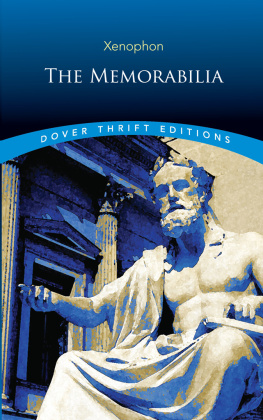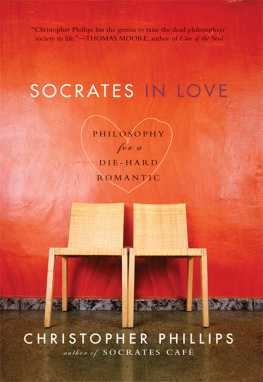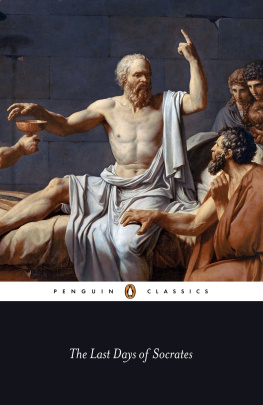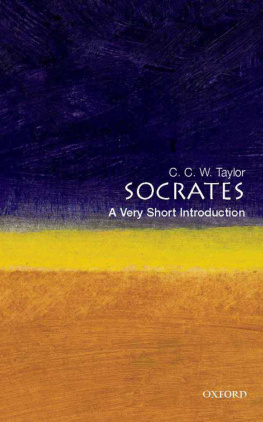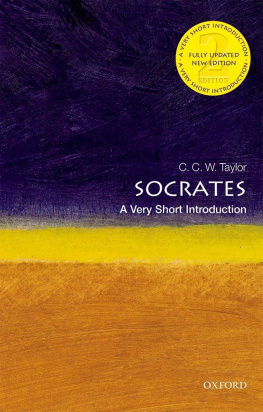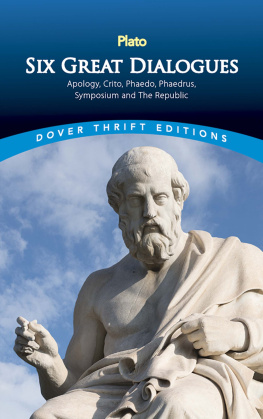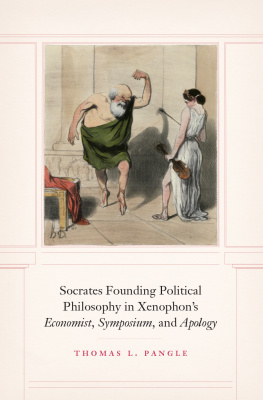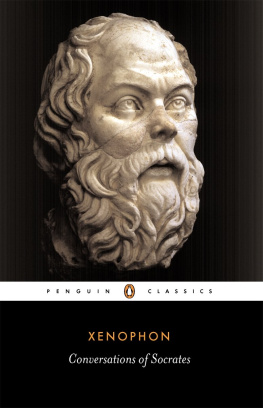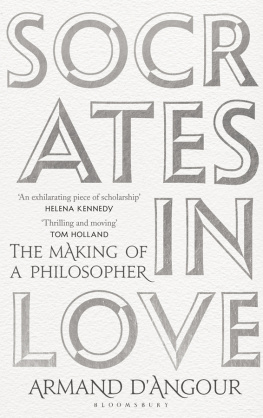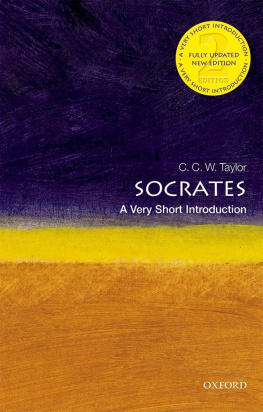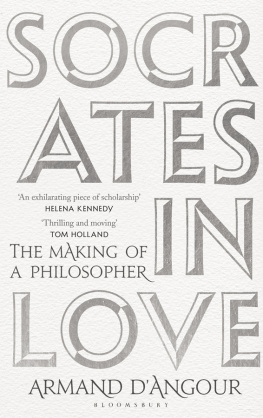Socrates - The Memorabilia
Here you can read online Socrates - The Memorabilia full text of the book (entire story) in english for free. Download pdf and epub, get meaning, cover and reviews about this ebook. City: Mineola;New York, year: 2018, publisher: Dover Publications, genre: Science. Description of the work, (preface) as well as reviews are available. Best literature library LitArk.com created for fans of good reading and offers a wide selection of genres:
Romance novel
Science fiction
Adventure
Detective
Science
History
Home and family
Prose
Art
Politics
Computer
Non-fiction
Religion
Business
Children
Humor
Choose a favorite category and find really read worthwhile books. Enjoy immersion in the world of imagination, feel the emotions of the characters or learn something new for yourself, make an fascinating discovery.
The Memorabilia: summary, description and annotation
We offer to read an annotation, description, summary or preface (depends on what the author of the book "The Memorabilia" wrote himself). If you haven't found the necessary information about the book — write in the comments, we will try to find it.
The Memorabilia — read online for free the complete book (whole text) full work
Below is the text of the book, divided by pages. System saving the place of the last page read, allows you to conveniently read the book "The Memorabilia" online for free, without having to search again every time where you left off. Put a bookmark, and you can go to the page where you finished reading at any time.
Font size:
Interval:
Bookmark:

THE MEMORABILIA

Xenophon
DOVER PUBLICATIONS, INC.
MINEOLA, NEW YORK
DOVER THRIFT EDITIONS
GENERAL EDITOR: SUSAN L. RATTINER
EDITOR OF THIS VOLUME: JIM MILLER
Copyright
Copyright 2018 by Dover Publications, Inc.
All rights reserved.
Bibliographical Note
This Dover edition, first published in 2018, is an unabridged republication of a standard edition of Xenophons The Memorabilia.
International Standard Book Number
ISBN-13: 978-0-486-82826-8
ISBN-10: 0-486-82826-3
Manufactured in the United States by LSC Communications
82826301 2018
www.doverpublications.com
Note
Xenophon was an ancient Greek historian, philosopher, and soldier. He was born into a wealthy Athenian family in or around 430 BC. Little is known of Xenophons childhood and youth, but he eventually became a student of Socrates and a writer on a variety of issues; ancient sources claim him as the author of over forty books, including an important treatise on horses.
Xenophon is best remembered today for his Anabasis, an account of the doomed expedition of Cyrus the Younger in which the general attempted to overthrow his brother, Artaxerxes II, and claim the throne of Persia. Xenophon himself took part in the campaign, and only returned home to Greece after great hardship. However, soon afterward he found himself fighting with Sparta against his home city of Athens and he was banished in 394 BC as a result. It was in this exile that he wrote Anabasis and several works on Socrates, including this current volume.
The Memorabilia consists of four books broken up into thirty-nine chapters. It is essentially an apologia, or defense, of Socrates. It was highly influential in antiquity and remains quite relevant today, offering a much different portrait of Socrates than the one given by his more famous contemporary, Plato. In addition, Xenophon, along with Plato and Aristophanes, are the only contemporaries of Socrates whose writings on the great philosopher are extant.
Xenophon himself was finally allowed to return from exile in 362 BC after his son Gryllus died fighting for Athens in the Battle of Mantinea. He would die of unknown causes in 354 BC, probably in Athens, but perhaps in Corinth.
Contents
BOOK I
I. I HAVE often wondered by what arguments those who drew up the indictment against Socrates could persuade the Athenians that his life was forfeit to the state. The indictment against him was to this effect: Socrates is guilty of rejecting the gods acknowledged by the state and of bringing in strange deities: he is also guilty of corrupting the youth.
First then, that he rejected the gods acknowledged by the statewhat evidence did they produce of that? He offered sacrifices constantly, and made no secret of it, now in his home, now at the altars of the state temples, and he made use of divination with as little secrecy. Indeed it had become notorious that Socrates claimed to be guided by the deity: it was out of this claim, I think, that the charge of bringing in strange deities arose. He was no more bringing in anything strange than are other believers in divination, who rely on augury, oracles, coincidences and sacrifices. For these mens belief is not that the birds or the folk met by accident know what profits the inquirer, but that they are the instruments by which the gods make this known; and that was Socrates belief too. Only, whereas most men say that the birds or the folk they meet dissuade or encourage them, Socrates said what he meant: for he said that the deity gave him a sign. Many of his companions were counselled by him to do this or not to do that in accordance with the warnings of the deity: and those who followed his advice prospered, and those who rejected it had cause for regret. And yet who would not admit that he wished to appear neither a knave nor a fool to his companions? but he would have been thought both, had he proved to be mistaken when he alleged that his counsel was in accordance with divine revelation. Obviously, then, he would not have given the counsel if he had not been confident that what he said would come true. And who could have inspired him with that confidence but a god? And since he had confidence in the gods, how can he have disbelieved in the existence of the gods? Another way he had of dealing with intimate friends was this: if there was no room for doubt, he advised them to act as they thought best; but if the consequences could not be foreseen, he sent them to the oracle to inquire whether the thing ought to be done. Those who intended to control a house or a city, he said, needed the help of divination. For the craft of carpenter, smith, farmer or ruler, and the theory of such crafts, and arithmetic and economics and generalship might be learned and mastered by the application of human powers; but the deepest secrets of these matters the gods reserved to themselves; they were dark to men. You may plant a field well; but you know not who shall gather the fruits: you may build a house well; but you know not who shall dwell in it: able to command, you cannot know whether it is profitable to command: versed in statecraft, you know not whether it is profitable to guide the state: though, for your delight, you marry a pretty woman, you cannot tell whether she will bring you sorrow: though you form a party among men mighty in the state, you know not whether they will cause you to be driven from the state. If any man thinks that these matters are wholly within the grasp of the human mind and nothing in them is beyond our reason, that man, he said, is irrational. But it is no less irrational to seek the guidance of heaven in matters which men are permitted by the gods to decide for themselves by study: to ask, for instance, Is it better to get an experienced coachman to drive my carriage or a man without experience? Is it better to get an experienced seaman to steer my ship or a man without experience? So too with what we may know by reckoning, measurement or weighing. To put such questions to the gods seemed to his mind profane. In short, what the gods have granted us to do by help of learning, we must learn; what is hidden from mortals we should try to find out from the gods by divination: for to him that is in their grace the gods grant a sign.
Moreover, Socrates lived ever in the open; for early in the morning he went to the public promenades and training-grounds; in the forenoon he was seen in the market; and the rest of the day he passed just where most people were to be met: he was generally talking, and anyone might listen. Yet none ever knew him to offend against piety and religion in deed or word. He did not even discuss that topic so favoured by other talkers, the Nature of the Universe: and avoided speculation on the so-called Cosmos of the Professors, how it works, and on the laws that govern the phenomena of the heavens: indeed he would argue that to trouble ones mind with such problems is sheer folly. In the first place, he would inquire, did these thinkers suppose that their knowledge of human affairs was so complete that they must seek these new fields for the exercise of their brains; or that it was their duty to neglect human affairs and consider only things divine? Moreover, he marvelled at their blindness in not seeing that man cannot solve these riddles; since even the most conceited talkers on these problems did not agree in their theories, but behaved to one another like madmen. As some madmen have no fear of danger and others are afraid where there is nothing to be afraid of, as some will do or say anything in a crowd with no sense of shame, while others shrink even from going abroad among men, some respect neither temple nor altar nor any other sacred thing, others worship stocks and stones and beasts, so is it, he held, with those who worry with Universal Nature. Some hold that
Font size:
Interval:
Bookmark:
Similar books «The Memorabilia»
Look at similar books to The Memorabilia. We have selected literature similar in name and meaning in the hope of providing readers with more options to find new, interesting, not yet read works.
Discussion, reviews of the book The Memorabilia and just readers' own opinions. Leave your comments, write what you think about the work, its meaning or the main characters. Specify what exactly you liked and what you didn't like, and why you think so.

